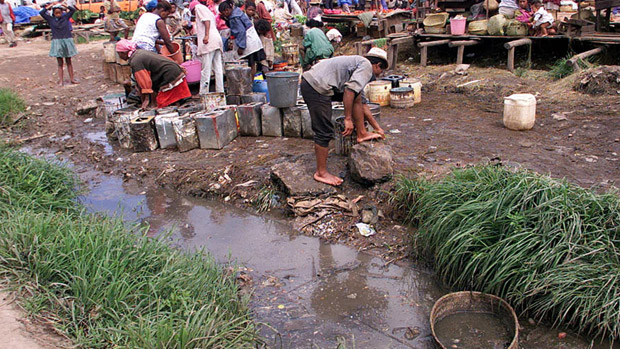Plague in Madagascar: fears of 'rapid spread' in capital city
'Black Death' disease kills 47 people and spreads to the densely populated capital of Antananarivo

A free daily email with the biggest news stories of the day – and the best features from TheWeek.com
You are now subscribed
Your newsletter sign-up was successful
An outbreak of plague has killed 47 people in Madagascar and reached the island's densely populated capital, raising fears of a "rapid spread".
Cases have been reported in seven regions, with two cases in the capital of Antananarivo, the largest city in Madagascar with a population of approximately 1.4 million.
The disease, which is similar to the Black Death that swept medieval Europe, is endemic in parts of Madagascar. But the World Health Organisation (WHO) says there is a "risk of rapid spread" now that it has reached Antananarivo, due to the city's high population density and the weakness of its healthcare system.
The Week
Escape your echo chamber. Get the facts behind the news, plus analysis from multiple perspectives.

Sign up for The Week's Free Newsletters
From our morning news briefing to a weekly Good News Newsletter, get the best of The Week delivered directly to your inbox.
From our morning news briefing to a weekly Good News Newsletter, get the best of The Week delivered directly to your inbox.
Health workers have mounted a pest control campaign through slum areas around the city, but WHO says the situation has been further complicated by a high level of resistance to deltamethrin, an insecticide used to control fleas.
The bacterial disease is caused by Yersinia pestis, which is spread by fleas and mostly affects rats. Humans bitten by an infected flea usually develop a bubonic form of plague, which causes a swelling of the lymph node and can prove fatal. Other symptoms can include chills, fever, muscle pain and seizures. If detected early enough, it can be treated successfully with antibiotics.
If the bacteria reach the lungs, it can then develop into pneumonic plague, which can be spread to other humans by coughing and can kill within 24 hours. Health officials says only two per cent of the cases in Madagascar were of this type.
Untreated bubonic plague can also develop into septicemic plague, where skin and other tissues can turn black and die, especially on fingers, toes and the nose.
A free daily email with the biggest news stories of the day – and the best features from TheWeek.com
The first case of the latest outbreak in Madagascar is believed to be a man from Soamahatamana village in the district of Tsiroanomandidy, around 130 miles from the capital. He was identified on 31 August and died three days later.
In Africa, plague is consistently reported from the Democratic Republic of the Congo, Madagascar and Tanzania. Although rare in the United States, it has been known to occur in parts of California, Arizona, Colorado and New Mexico. No British cases have been reported since 1918, says the National Travel Health Network and Centre.
-
 How the FCC’s ‘equal time’ rule works
How the FCC’s ‘equal time’ rule worksIn the Spotlight The law is at the heart of the Colbert-CBS conflict
-
 What is the endgame in the DHS shutdown?
What is the endgame in the DHS shutdown?Today’s Big Question Democrats want to rein in ICE’s immigration crackdown
-
 ‘Poor time management isn’t just an inconvenience’
‘Poor time management isn’t just an inconvenience’Instant Opinion Opinion, comment and editorials of the day
-
 Home Office worker accused of spiking mistress’s drink with abortion drug
Home Office worker accused of spiking mistress’s drink with abortion drugSpeed Read Darren Burke had failed to convince his girlfriend to terminate pregnancy
-
 In hock to Moscow: exploring Germany’s woeful energy policy
In hock to Moscow: exploring Germany’s woeful energy policySpeed Read Don’t expect Berlin to wean itself off Russian gas any time soon
-
 Were Covid restrictions dropped too soon?
Were Covid restrictions dropped too soon?Speed Read ‘Living with Covid’ is already proving problematic – just look at the travel chaos this week
-
 Inclusive Britain: a new strategy for tackling racism in the UK
Inclusive Britain: a new strategy for tackling racism in the UKSpeed Read Government has revealed action plan setting out 74 steps that ministers will take
-
 Sandy Hook families vs. Remington: a small victory over the gunmakers
Sandy Hook families vs. Remington: a small victory over the gunmakersSpeed Read Last week the families settled a lawsuit for $73m against the manufacturer
-
 Farmers vs. walkers: the battle over ‘Britain’s green and pleasant land’
Farmers vs. walkers: the battle over ‘Britain’s green and pleasant land’Speed Read Updated Countryside Code tells farmers: ‘be nice, say hello, share the space’
-
 Motherhood: why are we putting it off?
Motherhood: why are we putting it off?Speed Read Stats show around 50% of women in England and Wales now don’t have children by 30
-
 Anti-Semitism in America: a case of double standards?
Anti-Semitism in America: a case of double standards?Speed Read Officials were strikingly reluctant to link Texas synagogue attack to anti-Semitism